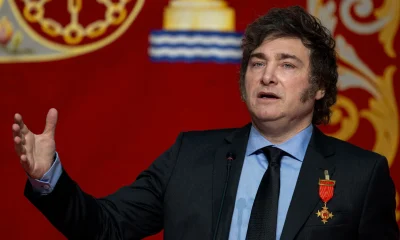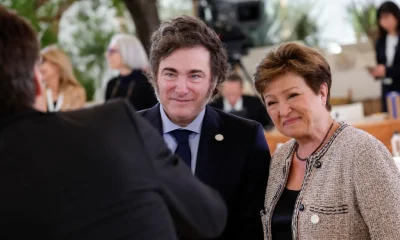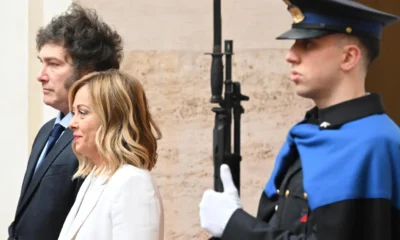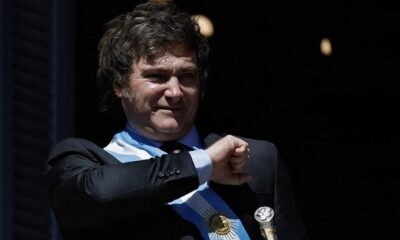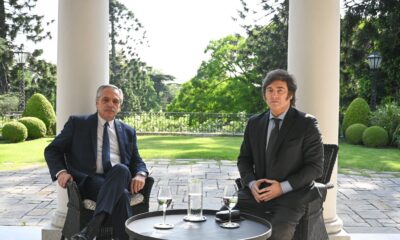International
Commissions of the Argentine Senate resume debate on key law for Javier Milei
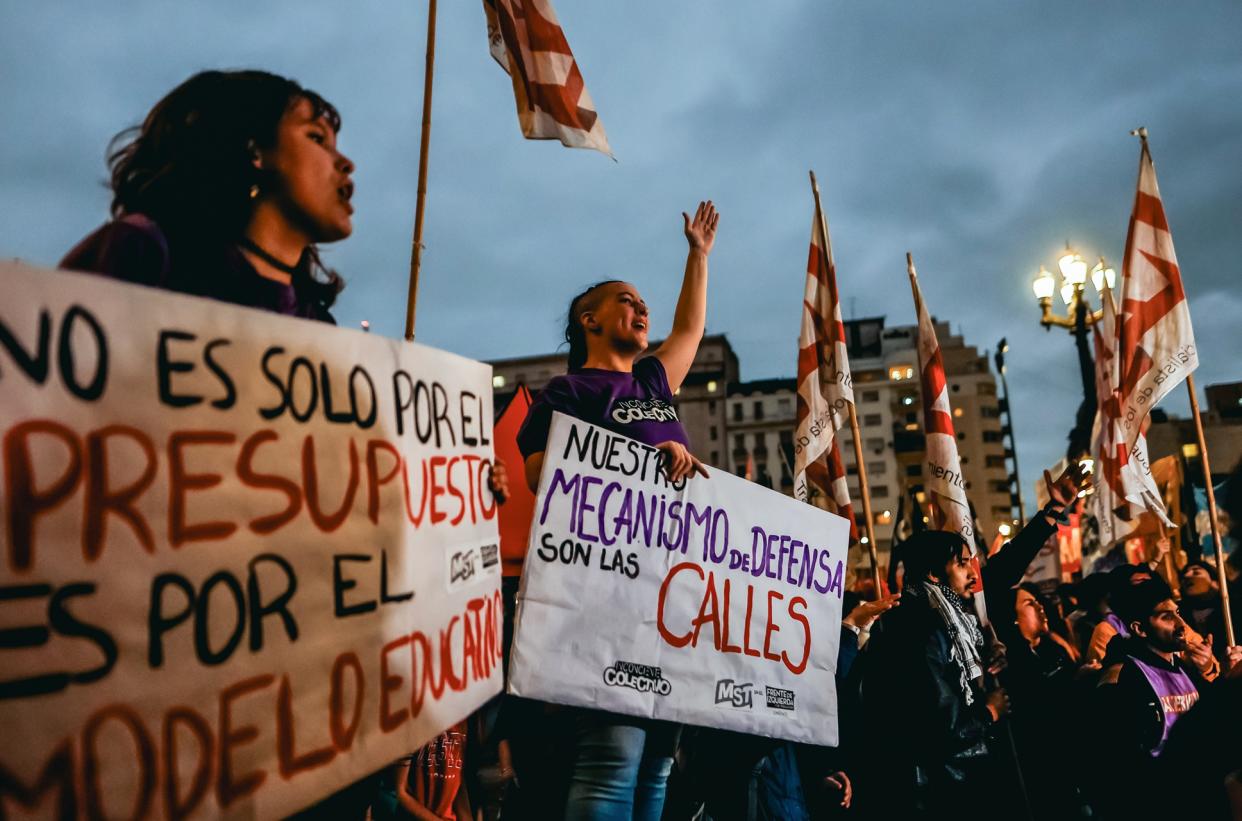
The Law Bases and Starting Points for the Freedom of Argentines, the star project of the Executive of Javier Milei, faces a decisive week from this Monday in its discussion prior to its processing in the Senate.
A plenary meeting of the Senate General Legislation, Budget and Finance and Constitutional Affairs committees will resume this Monday at 3:00 p.m. local time (18.00 GMT) the debate of the law and the fiscal package that were approved by Deputies on April 30 and that the Executive needs to show governance and sustainability to its economic program.
At the same time, the ruling party’s negotiations continue with the other blocks of Senators and provincial governors to approve a law that the Executive had imposed as a deadline before May 25.
Times run against the ruling party because several opposition leaders question the level of the income tax on wages, the Incentives for Large Investments (RIGI) Regime and money laundering that are contained in the bills.
If the senators modify the bill, they must return to Deputies so that it is finally sanctioned.
The presidential spokesman, Manuel Adorni, defended the RIGI on Monday by indicating that “it is not the looting of the country,” “it does not help entrepreneurs to take money abroad,” “much less merge SMEs,” but will attract investments of more than 200 million dollars that “are not made if there is no tax and exchange rate stability” and “will give impetus to the economy, investments and employment,” and will allow “triple the level of exports in a decade.”
The senators of La Libertad Avanza, a far-right party led by Milei, are only seven, another 33 are opposition Peronists and the rest of the 72 legislators of the Upper House are composed of potential allies.
This is the second time that Parliament has debated the bill, since in February it was approved in general by the Chamber of Deputies, but later, in the face of a sure defeat in the vote article by article in the Lower House and a foreseeable subsequent rejection in the Senate, the ruling party chose to return the bill to commissions.
After successive negotiations, the Government submitted a new project with 232 articles (compared to the 664 of the original initiative), the first of which declares the public emergency in administrative, economic, financial and energy matters for a period of one year, giving the Executive delegated powers in those matters, much less than those initially claimed by Milei.
The initiative allows the reform of the State, enables the privatization of a dozen companies, involves controversial changes in labor and retirement legislation and includes incentives for the energy and hydrocarbons sector and for large investments.
International
U.S. Senate Rejects Budget, Bringing Government Closer to Shutdown Amid DHS Dispute

The U.S. Senate voted on Thursday against a budget proposal in a move aimed at pressuring changes at the Department of Homeland Security (DHS), following the killing of two civilians during a deployment of immigration agents in Minneapolis.
All Senate Democrats and seven Republican lawmakers voted against the bill, which requires 60 votes to advance, pushing the country closer to a partial government shutdown that would cut funding for several agencies, including the Pentagon and the Department of Health.
The rejection came as Senate leaders and the White House continue negotiations on a separate funding package for DHS that would allow reforms to the agency. Proposed measures include banning Immigration and Customs Enforcement (ICE) agents from wearing face coverings and requiring them to use body-worn cameras during operations.
The vote took place just hours after President Donald Trump said he was “close” to reaching an agreement with Democrats and did not believe the federal government would face another shutdown, following last year’s record stoppage.
“I don’t think the Democrats want a shutdown either, so we’ll work in a bipartisan way to avoid it. Hopefully, there will be no government shutdown. We’re working on that right now,” Trump said during a Cabinet meeting at the White House.
International
Trump Says Putin Agreed to One-Week Halt in Attacks on Ukraine Amid Extreme Cold

U.S. President Donald Trump said on Thursday that he secured a commitment from Russian President Vladimir Putinto halt attacks against Ukraine for one week, citing extreme weather conditions affecting the region.
“Because of the extreme cold (…) I personally asked Putin not to attack Kyiv or other cities and towns for a week. And he agreed. He was very pleasant,” Trump said during a Cabinet meeting broadcast by the White House.
Trump acknowledged that several advisers had questioned the decision to make the call.
“A lot of people told me not to waste the call because they wouldn’t agree. And he accepted. And we’re very happy they did, because they don’t need missiles hitting their towns and cities,” the president said.
According to Trump, Ukrainian authorities reacted with surprise to the announcement but welcomed the possibility of a temporary ceasefire.
“It’s extraordinarily cold, record cold (…) They say they’ve never experienced cold like this,” he added.
Ukrainian President Volodymyr Zelensky later commented on the announcement, expressing hope that the agreement would be honored.
International
Storm Kristin Kills Five in Portugal, Leaves Nearly 500,000 Without Power

Storm Kristin, which battered Portugal with heavy rain and strong winds early Wednesday, has left at least five people dead, while nearly half a million residents remained without electricity as of Thursday, according to updated figures from authorities.
The revised death toll was confirmed to AFP by a spokesperson for the National Emergency and Civil Protection Authority (ANPEC). On Wednesday, the agency had reported four fatalities.
Meanwhile, E-Redes, the country’s electricity distribution network operator, said that around 450,000 customers were still without power, particularly in central Portugal.
Emergency services responded to approximately 1,500 incidents between midnight and 8:00 a.m. local time on Wednesday, as the storm caused widespread disruptions.
The Portuguese government described Kristin as an “extreme weather event” that inflicted significant damage across several regions of the country. At the height of the storm, as many as 850,000 households and institutions lost electricity during the early hours of Wednesday.
Several municipalities ordered the closure of schools, many of which remained shut on Thursday due to ongoing adverse conditions.
Ricardo Costa, regional deputy commander of the Leiria Fire Brigade, said residents continue to seek assistance as rainfall persists.
“Even though the rain is not extremely intense, it is causing extensive damage to homes,” he noted.
In Figueira da Foz, a coastal city in central Portugal, strong winds toppled a giant Ferris wheel, underscoring the severity of the storm.
-

 International3 days ago
International3 days agoU.S. Senate Rejects Budget, Bringing Government Closer to Shutdown Amid DHS Dispute
-

 International4 days ago
International4 days agoFootball Fan Killed in Clashes After Colombian League Match
-

 Central America4 days ago
Central America4 days agoGuatemala President Says Starlink Terminal Found Inside Prison
-

 International4 days ago
International4 days agoRubio Says U.S. Could Participate in Follow-Up Russia-Ukraine Talks
-

 International4 days ago
International4 days agoMissing Spanish Sailor Rescued After 11 Days Adrift in Mediterranean
-

 Central America2 days ago
Central America2 days agoPanama Supreme Court Strikes Down Panama Ports Concession as Unconstitutional
-

 International3 days ago
International3 days agoStorm Kristin Kills Five in Portugal, Leaves Nearly 500,000 Without Power
-

 Central America2 days ago
Central America2 days agoU.S. and Guatemala Sign Trade Deal Granting Zero Tariffs to Most Exports
-

 International3 days ago
International3 days agoMan Arrested After Vehicle Crashes Into Jewish Institution in Brooklyn
-

 International3 days ago
International3 days agoTrump Says Putin Agreed to One-Week Halt in Attacks on Ukraine Amid Extreme Cold
-

 Central America6 hours ago
Central America6 hours agoCosta Rica Goes to the Polls as Voters Choose Continuity or Change

























